Housed in it spacious new building that included research facilities for human and
animal research as well as the Student Services Center, the Department of Psychology
was well positioned to launch a doctoral program of study. Course content in psychology
was considered essential learning for most of the other undergraduate programs on
campus, so consequently, the department had regularly engaged in the practice of
hiring graduate students as instructors to cover the high teaching demand. While
many were accomplished instructors, no program in the state existed for them to pursue
a doctoral education in their chosen field of study. The department was committed
to providing them that opportunity.
In 1963, the Department first advertised its new doctoral program as consisting of two tracks, one focusing on the Teaching of General Psychology and the other focusing on preparation for clinical services. As depicted in the course catalog below, all degree recipients were required to acquire the ability to read both French and German languages, mainly because much of the historic literature in psychology was written in these languages. To ensure that doctoral students could concentrate on their studies, the department offered graduate assistantships as either laboratory instructors or psychometrists, and each included a tuition waiver and an annual stipend of $2,000.
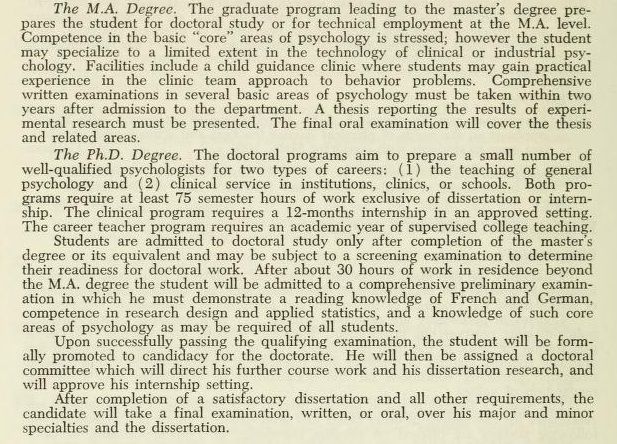
Initial description of the doctoral program in the Department of Psychology from the WVU Catalog (1963-64)
The First PhD granted in Psychology at WVU
David Dale Cole was the first recipient of the PhD degree in psychology from WVU, under the mentorship of Professor Shafer. Dr. Cole, or “Doc” to his family and friends, was a native West Virginian, born in Farmington, WV, who graduated from Barrackville High School in 1950. After a brief stint at Fairmont State University, he transferred to Purdue University where he obtained a bachelor’s degree in psychology in 1958. He was accepted into the graduate program at WVU and earned his master’s degree in psychology in 1960. Upon completion of this degree, he was hired as an instructor in the Department of Psychology. Naturally, when the opportunity to continue his studies and pursue a doctoral degree was available to him, he pursued it enthusiastically. His dissertation work was entitled “A study of social dominance in cats,” which he defended successfully on July 16, 1964. In brief, his study found that the natural dominance hierarchy of cats was altered when barriers were encountered during the measurement of social dominance of the animals.
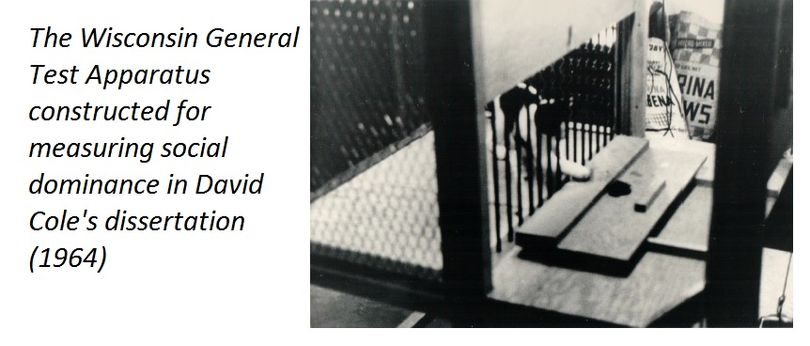
Modifications to the Doctoral Program Structure
Not long after the doctoral program began granting PhDs, there was general acknowledgement that the focus on the activities of teaching and clinical service was too narrow and that acquisition of research competencies should play a central role in doctoral education. To support this agenda, it was agreed that the graduate program was best structured around specific areas of research emphasis rather than constructing a faculty comprised of one or two faculty members representing every area of study psychology had to offer. Using this approach, the best faculty and top graduate students could be strategically recruited to WVU in these focal areas of study. Surrounded by colleagues with common interests in these areas of emphasis, the institution would achieve national and international prominence in these designated areas.
The initial research area of emphasis defined was Life Span Developmental Psychology, first announced in 1966. Two existing faculty members with expertise in developmental psychology (Lester L. Ourth and Larry R. Goulet) were joined by three new hires in developmental psychology in 1967 (Paul B. Baltes, John R. Nesselroade, and Frank H. Hooper) and K. Warner Schaie, who moved from the Clinical Psychology area the following year (and became department chair). The success of this approach was obvious and it put West Virginia University on the map as the first program in Life Span Developmental Psychology in the country. Further recognition was bestowed on this program area when the university selected Hayne W. Reese as a named Centennial Professor to cap the institution’s celebration of its centennial year.
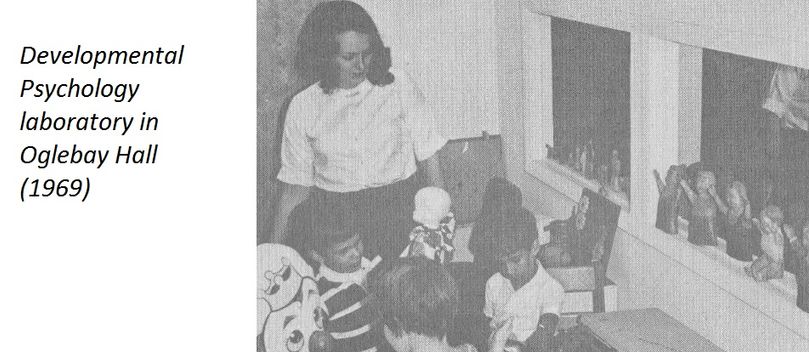
Click here to view a timeline of faculty comprising the Life Span Developmental Psychology area
The Teaching of General Psychology and Clinical Psychology areas were quick to follow the path paved by the Life Span Developmental Psychology area. Although each of these areas already possessed an adequate number of faculty lines, they began advertising goals of training doctoral students in both research and teaching (and practice for the Clinical Psychology area), goals that have been central to these program areas for over 50 years. Reflecting this altered focus, the Teaching of General Psychology changed its name to Experimental Psychology in 1969 (and Behavior Analysis in 1976).
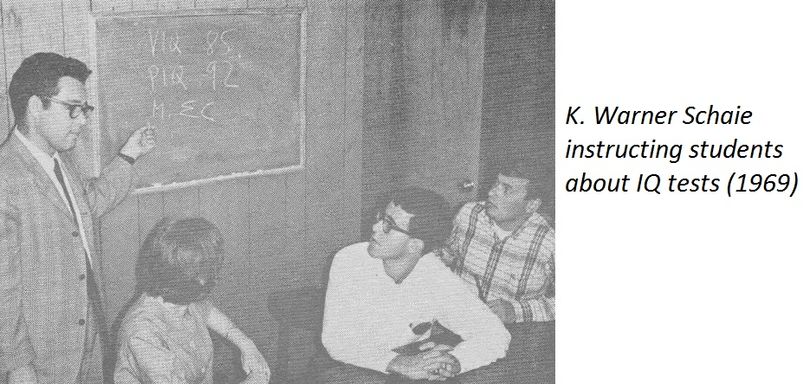
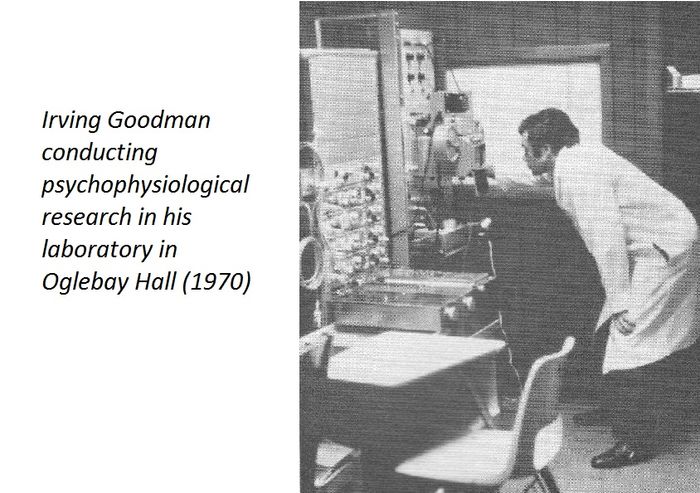
Click here to view a timeline of faculty comprising the Teaching of General Psychology/Experimental Psychology/Behavior Analysis area
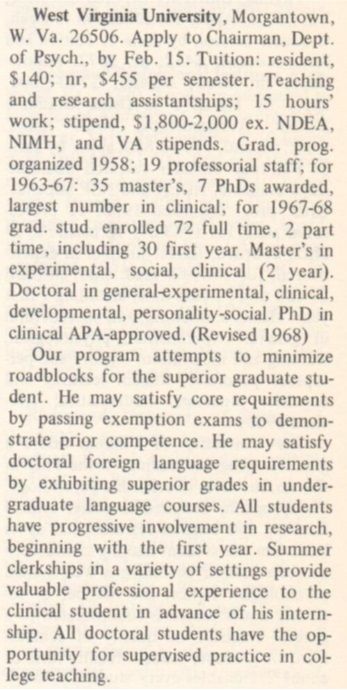 Description of WVU’s graduate program in APA’s
Graduate Study in Psychology (1969). Washington, DC: American Psychological
Association
Description of WVU’s graduate program in APA’s
Graduate Study in Psychology (1969). Washington, DC: American Psychological
Association
Shortly after graduating their first PhD students, the Clinical Psychology area actively pursued accreditation by the American Psychological Association (APA). Although no faculty member from WVU participated in the Boulder Conference that outlined the scientist-practitioner model of training for professional practice of psychology, they were quite aware of its importance and that other programs around the country were pursuing APA accreditation by adhering to the principles that were derived from this conference. Hints of this were evident in the initial description of the doctoral program in clinical psychology that required students in this area to complete a “12-month internship in an approved setting.” Based on the desire to promote the highest academic standards of the profession, the department submitted its application to become an APA-accredited program and was granted this status in 1966.
Click here to view a timeline of faculty comprising the Clinical Psychology area
By all accounts, the doctoral program in psychology was a rapid success, granting 22 PhDs during the 1960s. Faculty and graduate students regularly contributed to the growing empirical literature in psychology and their programs received considerable attention at national conferences and professional meetings. By the end of the decade, the Department of Psychology had 72 graduate students enrolled across the three doctoral program areas and the master’s program that had been producing graduates for over two decades.
Based upon the success of the three existing graduate program areas, the Department decided to replicate the faculty and graduate student recruitment strategy within the area of Personality and Social Psychology. In 1969, as seen in the program description in APA’s Graduate Study in Psychology publication above, this new area was listed. Unfortunately, the department was unable to repeat its success in launching this new program area and it was discontinued after only one year.
In 1963, the Department first advertised its new doctoral program as consisting of two tracks, one focusing on the Teaching of General Psychology and the other focusing on preparation for clinical services. As depicted in the course catalog below, all degree recipients were required to acquire the ability to read both French and German languages, mainly because much of the historic literature in psychology was written in these languages. To ensure that doctoral students could concentrate on their studies, the department offered graduate assistantships as either laboratory instructors or psychometrists, and each included a tuition waiver and an annual stipend of $2,000.
Initial description of the doctoral program in the Department of Psychology from the WVU Catalog (1963-64)
The First PhD granted in Psychology at WVU
David Dale Cole was the first recipient of the PhD degree in psychology from WVU, under the mentorship of Professor Shafer. Dr. Cole, or “Doc” to his family and friends, was a native West Virginian, born in Farmington, WV, who graduated from Barrackville High School in 1950. After a brief stint at Fairmont State University, he transferred to Purdue University where he obtained a bachelor’s degree in psychology in 1958. He was accepted into the graduate program at WVU and earned his master’s degree in psychology in 1960. Upon completion of this degree, he was hired as an instructor in the Department of Psychology. Naturally, when the opportunity to continue his studies and pursue a doctoral degree was available to him, he pursued it enthusiastically. His dissertation work was entitled “A study of social dominance in cats,” which he defended successfully on July 16, 1964. In brief, his study found that the natural dominance hierarchy of cats was altered when barriers were encountered during the measurement of social dominance of the animals.
Modifications to the Doctoral Program Structure
Not long after the doctoral program began granting PhDs, there was general acknowledgement that the focus on the activities of teaching and clinical service was too narrow and that acquisition of research competencies should play a central role in doctoral education. To support this agenda, it was agreed that the graduate program was best structured around specific areas of research emphasis rather than constructing a faculty comprised of one or two faculty members representing every area of study psychology had to offer. Using this approach, the best faculty and top graduate students could be strategically recruited to WVU in these focal areas of study. Surrounded by colleagues with common interests in these areas of emphasis, the institution would achieve national and international prominence in these designated areas.
The initial research area of emphasis defined was Life Span Developmental Psychology, first announced in 1966. Two existing faculty members with expertise in developmental psychology (Lester L. Ourth and Larry R. Goulet) were joined by three new hires in developmental psychology in 1967 (Paul B. Baltes, John R. Nesselroade, and Frank H. Hooper) and K. Warner Schaie, who moved from the Clinical Psychology area the following year (and became department chair). The success of this approach was obvious and it put West Virginia University on the map as the first program in Life Span Developmental Psychology in the country. Further recognition was bestowed on this program area when the university selected Hayne W. Reese as a named Centennial Professor to cap the institution’s celebration of its centennial year.
Click here to view a timeline of faculty comprising the Life Span Developmental Psychology area
The Teaching of General Psychology and Clinical Psychology areas were quick to follow the path paved by the Life Span Developmental Psychology area. Although each of these areas already possessed an adequate number of faculty lines, they began advertising goals of training doctoral students in both research and teaching (and practice for the Clinical Psychology area), goals that have been central to these program areas for over 50 years. Reflecting this altered focus, the Teaching of General Psychology changed its name to Experimental Psychology in 1969 (and Behavior Analysis in 1976).
Click here to view a timeline of faculty comprising the Teaching of General Psychology/Experimental Psychology/Behavior Analysis area
Shortly after graduating their first PhD students, the Clinical Psychology area actively pursued accreditation by the American Psychological Association (APA). Although no faculty member from WVU participated in the Boulder Conference that outlined the scientist-practitioner model of training for professional practice of psychology, they were quite aware of its importance and that other programs around the country were pursuing APA accreditation by adhering to the principles that were derived from this conference. Hints of this were evident in the initial description of the doctoral program in clinical psychology that required students in this area to complete a “12-month internship in an approved setting.” Based on the desire to promote the highest academic standards of the profession, the department submitted its application to become an APA-accredited program and was granted this status in 1966.
Click here to view a timeline of faculty comprising the Clinical Psychology area
By all accounts, the doctoral program in psychology was a rapid success, granting 22 PhDs during the 1960s. Faculty and graduate students regularly contributed to the growing empirical literature in psychology and their programs received considerable attention at national conferences and professional meetings. By the end of the decade, the Department of Psychology had 72 graduate students enrolled across the three doctoral program areas and the master’s program that had been producing graduates for over two decades.
Based upon the success of the three existing graduate program areas, the Department decided to replicate the faculty and graduate student recruitment strategy within the area of Personality and Social Psychology. In 1969, as seen in the program description in APA’s Graduate Study in Psychology publication above, this new area was listed. Unfortunately, the department was unable to repeat its success in launching this new program area and it was discontinued after only one year.
Click here to view a timeline of faculty comprising the Personality and Social
Psychology area